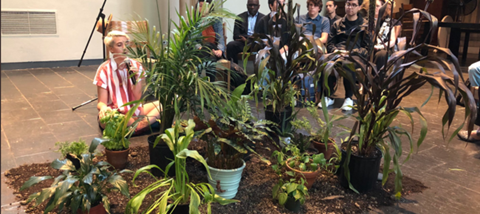
Oh. My. Goodness. What were they thinking? Union Theological Seminary in the US caused much hilarity this week when students hosted a service of confession to plants.
Christendom went wild over a tweet from Union Seminary which featured a picture of a young woman sitting cross-legged on the floor and apparently addressing an array of potted vegetation. The mocking puns were impressive. Church planting. Veggietales. Questions about what plants they were smoking.
And yet, at its root (sorry), what Union seemed to be trying to do, according to a clarifying tweet) was affirm the value of the created world as valuable and made by God. And I know recognising that is less fun than asking them if they want to bough out of theological education or whether if might branch out into other rituals (or simply asking them to leave), but their explanation of what they did is actually beautiful. And it’s not as unbiblical as you may think (if you can get past the puns and the knee-jerk desire to put other people down – I know I’m still struggling to).
Bible-believing Christians are often keen to point out that the rainbow was a symbol of God’s mercy and grace before it was co-opted to represent sexual and gender identity. And that’s true. But have you read the passages recently? Read them again. I’ll wait. Read Genesis 9:8-17 again and notice the emphasis of God’s holy Word. The Lord makes his rainbow covenant with all living things. He uses language that would get a fellow Christian denounced and derided as a hippie.
I’m not going to go into the times people in the Bible, including Jesus, talked to plants. That’s a stupid way to defend the good people at Union. And I will say that I myself would probably prefer a liturgy that talks to God instead of to the less conscious among his living creatures (this lament to God for the Amazon for instance). But the spirit of their liturgy, as they explain it, is significantly closer to the love I see God expressing for his world in Genesis than the scoffers would have us believe.
That said, it’s a funny picture. And I don’t want to be a buzz-kill. So here’s five other hilarious things churches have done that feel at least as silly as talking to plants:
1. That time when loads of Christians in America pledged allegiance to a flag, lol. Cut from the same cloth as Union, amirite?
2. When all those British Christians sang a song about God specifically saving their Queen. Like, we get it, you like tiaras. But everybody’s got a ruler. Why would God like yours more than everyone else’s? Slavery? Warm beer?
3. That one time when grown adults got tears in their eyes because 11 dudes were moderately less agile than another bunch wearing different clothes. Yeeeeeaah. Tragic. Oh, and they had songs, too.
4. That hilarious time when huge numbers of us blamed the problems that are patently caused by an unjust economic system on people who were born beyond a specific body of water. As if they were magical. Duh.
5. That awkward moment when we, the people who serve the God of love and mercy and grace, decided that the best way to represent our omnipotent yet gentle Saviour would be to always ridicule the gentle, the overly kind and the weak, rather than sitting at their feet and learning from them. What. A. Laugh.
The people at Union Seminary may have been naïve in their tweet. But what they are saying is right. God has given us the miraculous physical, the world we inhabit, and he has filled it with his own breath of life. He loves it. And we could think of worse ways of starting our repentance for our failure to be stewards than apologising to the world we have harmed. We must apologise more fully to the God who created it, and go forth and defend it, all of it, human, animal and plant, like a brother and a loved one. We can learn from the life God has created. He can teach us through it.
After all: what are fronds for?
Premier Christianity is committed to publishing a variety of opinion pieces from across the UK Church. The views expressed on our blog do not necessarily represent those of the publisher.




























